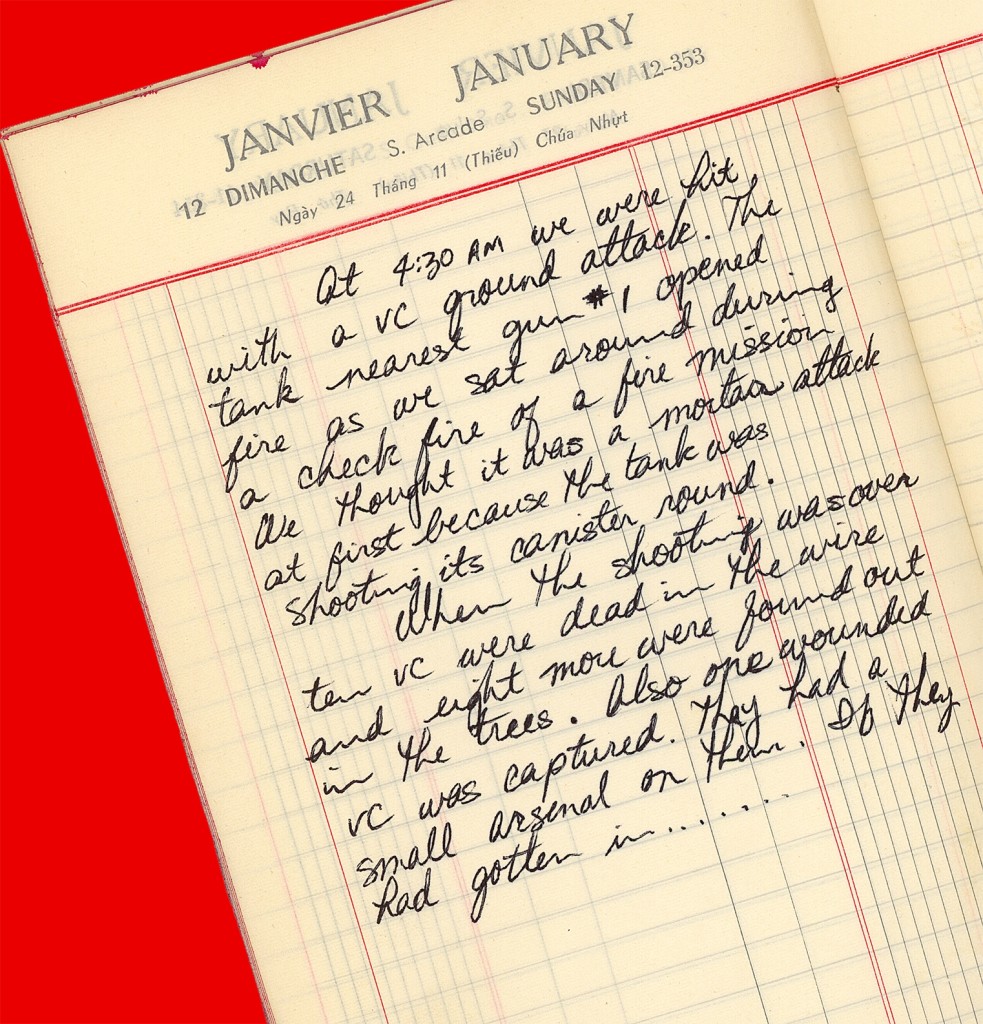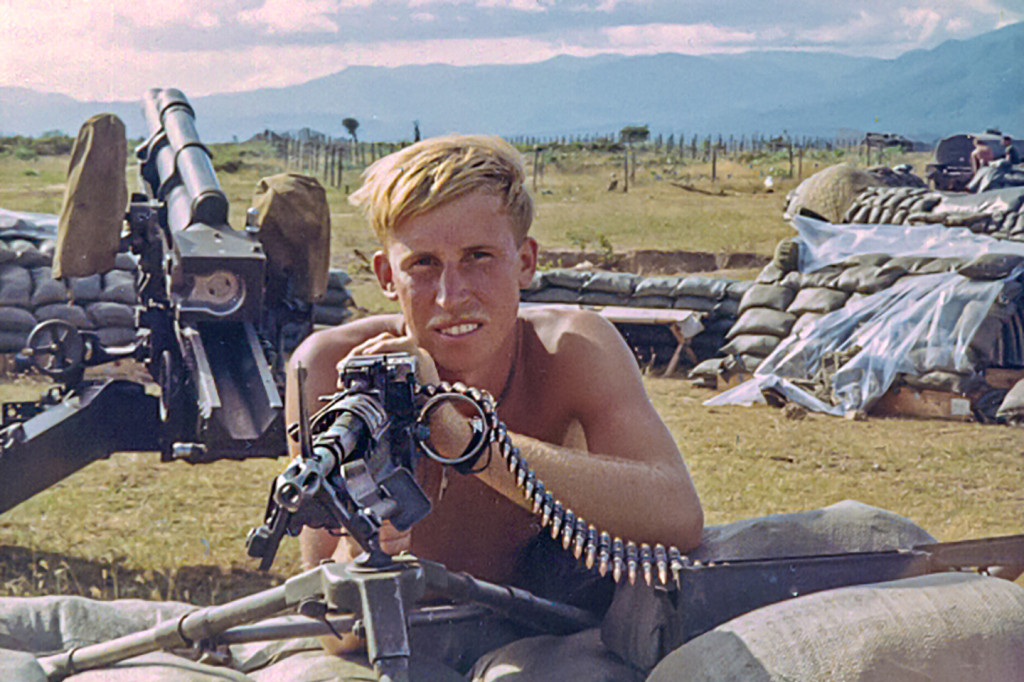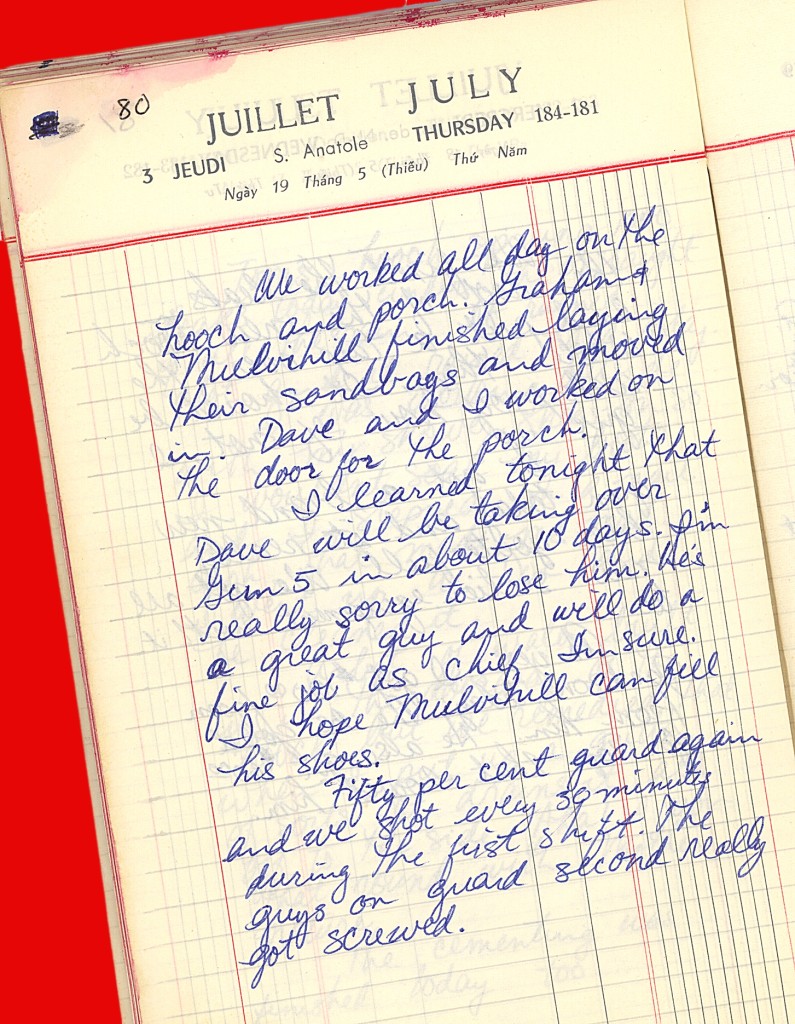THE BOYS OF BATTERY B
STAFF SGT. RIK GROVES
GUN CREW CHIEF
PART THREE
At this point in the drama of B Battery, First Sergeant Farrell climbs on stage. He is one of those characters the troops either loved … or did not love. No one was neutral on the subject.
First Sergeant Farrell, I liked him a lot. He was very fair. He had a temper and his voice had an edge to it, but he was always fair. That was the bottom line. If he ever went off on me, I deserved it.
One night I was on guard and he came out and said, “Sgt. Groves, I want you to come with me for a minute.” We went down to Gun 4 and there was a guy asleep on guard. Sgt. Farrell wanted a witness. He shined his flashlight in the guy’s face and said, “You see that?”
I said, “Yeah.”
He said, “OK, I just wanted a witness.”
I had to write a statement. Farrell did it the right way with a witness. The guy didn’t get busted, just a reprimand of some sort, which was pretty light punishment for sleeping on guard.
Early in my journal I was reminded I got hit by a piece of shrapnel during a mortar attack. A mortar exploded right out in front of our gun. A piece of shrapnel hit me right below the right corner of my mouth and knocked my head back. It hurt like hell. I was scared to touch it because I knew enough about shock to know that my jaw might be gone without my feeling it. I could be dying. Finally I got the nerve to touch it. My face was still there and it was warm to the touch but the shrapnel didn’t break the skin – nothing. Either the flat side of the metal shrapnel hit me, or it was a stone. If the shrapnel was from the outside of the round, it’s gonna be flat.
Farrell comes by after the firing stops and asks if everybody’s all right. I say, “I took some shrapnel in the jaw but it didn’t break the skin.’”
He pulls out his pocketknife and says, “Here, let me give you a little nick, draw a little blood, and we’ll get you a Purple Heart.”
I wasn’t looking for a Purple Heart, just telling him the story. I ended up getting a Purple Heart, but not for that.
April 2, 1969 …
… marks the date when the boys of Battery B begin to die.
I was coming back from Vung Tao on in-country R&R when I got the news.
Of course I remembered sitting next to Sherlock back in Phan Rang when we were both new in country and coming out to Sherry together. I would see Steve around the battery. He was assigned to a different gun, but I remember him well. I never knew Percy, he was only in the battery a couple weeks.
Tom Townley was the medic at LZ Sherry when the mine exploded. The following is from Doc Townley’s earlier account posted August 22, 2013.
I was burning shit at the time, when I heard an explosion and looked up and could see the smoke over the tree line. And I knew something had happened but I didn’t know what. And then all of a sudden I saw a Jeep come flying towards the firebase screaming and yelling, “Doc, Doc, get over here.” Well I ran and grabbed my bag and jumped on the jeep, and they took me out there.
I got out of the jeep and was walking along the side of the road. Farrell probably saved my life. He said, “Doc! Stop! Watch where you’re walking.”
And I stopped.
He said, “You can’t walk over there. Walk on the hardpan.”
I came close to stepping on one of those bombs that when you step on it all the little bombs pop up in the air. I almost stepped on it. The Viet Cong picked up artillery rounds and bombs that never exploded and buried them as mines. There was enough explosives in this one it would have blown my leg off.
But I had to take care of Gulley. He was blown away from here down.
Tom places his hand at his rib cage.
There was nothing there. Nothing. It was gone. His one arm was gone. And he was still alive. Well I wrapped his arm for him, because he saw it. Told him he was going to be all right, that was all I could tell him, you know. I still have dreams about that. But there was nothing I could do, absolutely nothing I could do. There was nothing there to do anything with. You know what I mean? But he hung in there for a good 20 minutes. It took that much time, and he was still alive.
He is silent for a long moment.
The way …. the way … he was blown, it must have constricted the blood flow, enough to keep him alive. He had enough blood in him to keep him alive apparently. Sherlock was already dead. He was gone. There was nothing we could do for him.
They were not the only ones I saw when I was there. I saw a couple of Vietnamese that they brought in and wanted me to fix up. They were already dead.
Judson and another guy they took right down to the helipad at Sherry because they had a helicopter coming in. I did not treat either one of them. I didn’t talk to them or anything. They just sent them right on through because they were mostly superficial wounds.
“Were you the only medic there?”
I was the only medic, but when they say you’re the only medic it means the only one trained to be a medic. But you had people like First Sergeant Farrell and there was an E7 sergeant there. They had enough experience that they were just as good a medic as I was. So I really wasn’t alone. You were never alone over there. Everybody had your back. Farrell was a little different, but I’ll tell you what, he was all business when he was business. He was 100% business. He was a good first sergeant.
May 17, 1969
Six weeks later two more soldiers die on an airmobile operation at LZ Nora, ten miles north of Sherry. It is a lonely outpost at the top of a barren hill.
There were just two guns there, my Gun 2, BAD NEWS in the foreground, and another gun. No one can remember the name of that gun. Nora was a small area at the top of a hill. It was such a small area the choppers had to set our stuff down at the bottom of the hill and we had to haul everything up the hill to set up the guns. It was really a bitch. They would bring in our ammo and water blivets and dump everything at the bottom of the hill. You could see how little protection we had if we ever had a ground attack. That’s the same way it was back in January.
Journal entry of May 17, 1969
I am very sorry to write that at 2 AM this morning we had two more men killed. Staff Sergeant Johnson and his loader Lloyd Handschumaker died. It happened out at Nora. Both guns were shooting together in a sort of ‘mad minute’. My gun shot a round that suddenly detonated right over the hooches. It killed Jim instantly. ‘Hand Job’, as we called him, died while waiting for the Dust Off. Mulvihill, Leggett and Bongi were wounded using my gun, and Williams was wounded on the other gun. They said it was a malfunction of a PD (point detonating) fuse.
My gun was involved, but not my crew. On May 7 Captain Marquette, our new battery commander, decided to switch the crews out. So Tommy Mulvihill’s crew from Gun 4 came out and took over my gun, and we rotated back to Sherry and worked Tommy’s gun. The crew from gun 1 came out and took over the other gun.
When the accident happened the guns were shooting nighttime H&I to keep the VC off the perimeter. You can see from the picture there wasn’t much between us and them. The guns were turned roughly 45 degrees to the right from where the picture shows them pointed. So BAD NEWS was aiming just to the left of the other gun. A round left my gun and detonated practically right out of the tube. It killed Jim Johnson and Lloyd Handschumaker on that other gun and wounded Williams. It also wounded Tommy Mulvihill, Leroy Leggett and Tony Bongi working my gun.
At LZ Nora Tommy Mulvihill earned the first of three Purple Hearts. He would be wounded five times over the course of his tour in Vietnam. For Tony this was the first of two Purple Hearts.
Almost Killed a Kid
This is an important story, because I came within a whisker of killing a little Vietnamese kid. We are coming back from town on a convoy. I am in the first truck, which is the second vehicle in the convoy behind the lead jeep. I have ammo in the back of my truck, and there are two or three trucks behind me, and then there is the Dusters’ truck. It is the only truck in the convoy that has nothing in its bed, because they were unable to get their ammo.
All of a sudden there is a huge explosion. I turn around and look back and there’s this huge black ball of smoke drifting into the sky. SOP was you never stop if you get hit, you hightail it out of there. They’d try to take the front truck out, and then the back truck, and then they finish you off. I am the ranking NCO, and I immediately grab my M16 and yell at my driver to take off. I jump out and run around behind the truck to the other side of the road and start heading down there. I’m waving everybody by me yelling GO, GO, GO.
I see a Vietnamese kid running along the rice paddy dyke and there’s an ARVN soldier chasing him. I know that kid set off the mine, a command detonated mine, and I know he killed some of my friends, I know he killed those guys in that truck. I pull up my M16 – I get chills when I tell this story – I pull my M16 up and I flip it on AUTOMATIC and I aim it right at his ankles, and I’m going to let it naturally crawl right up him. I’m gonna kill that little shit. I yell, “DUNG LAI,”, which means STOP. I yell again, “DUNG LAI, DUNG LAI,” and he keeps running. The ARVN is chasing the kid and he is running away. I start to squeeze the trigger, and all I can say is the good Lord had to do it, because I didn’t do it voluntarily. I pull my rifle up and shoot a couple short bursts in the air. The kid stops dead in his tracks. He turns around crying and screaming. The ARVN grabs him and shakes him and I know what he was saying to the kid – If you run away they’re going to shoot you. It turns out the kid didn’t do anything. He was just out there to get candy. I see the chain of events in my head – when the explosion goes off he gets scared and starts running, I assume he had set it off, he killed my friends, now I’m gonna shoot him.
I go back to the blown up truck. The front set of dual tires on each side are blown into the rice paddy, maybe 30 feet away. The explosion opened the back bed of the truck up like putting a cherry bomb in a tin can. There’s diesel and oil running all over. Luckily it was the only truck that didn’t have anything in it. The lead jeep, and my truck that had a load of ammo, and two or three other trucks rolled over that same spot and somehow missed the detonator. The only truck that hits it, not only did it not have any ammo, but my two buddies didn’t have a scratch on them. Their eyes are big as saucers and they can’t hear for awhile, but they didn’t have a scratch.
I almost killed a kid for nothing. I was within an eyelash of killing that kid. I get emotional just saying it.




